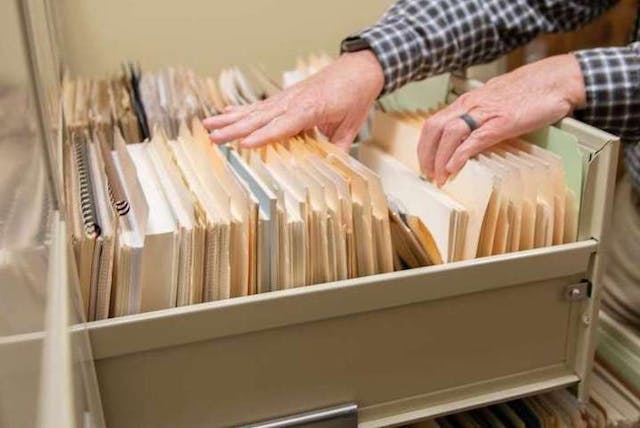Featured Stories

Memorial Cards
This month, we've launched the interim database of our Memorial Card Collection, donated by Phillip Jones. You are now able to search the full Memorial Card Collection of 4,500 and 8,500 digital images. Mourners sent the cards after the loss of a loved one to distant family members, friends and neighbours announcing the death and giving details of the funeral. Cards like these can be used to build a family tree.

April Fool's Day
The origins of April Fool’s Day are disputed. What is clear is that there is evidence stretching back to at least the 16th century of 1 April being a day marked with practical jokes. Many of our ancestors would have taken part in this over the years. This day of pranks is still observed across Europe. Even within the UK, however, there have historically been differences in how our ancestors spent the day. In Scotland, for example, April Fools' Day was originally called 'Huntigowk (or Huntegowk) Day' and was celebrated on the first two days of the month.

Easter and Genealogy
April 2022 marks the season of Easter, with its themes of life, death, and resurrection. For genealogists, life and death are at the heart of all we do. Through the study of family history, we can bring the dead back to life (albeit not quite as powerfully as through the resurrection). Genealogists tend not to fear places of the dead, such as churchyards and cemeteries. It is not death that dominates in family history, but life. As long as we can read the names on their monuments, we are able to keep our ancestors alive.
Upcoming talks and events

Stage 2 Family History Skills Evening Course
The Society of Genealogists' successful 12-week family history skills course continues with a second set of Thursday evening classes to develop your research and genealogy knowledge.
Have you had some success in tracing your family but want to be better? These classes move you forward. Learn about the range of records that are available, and more importantly, learn the best ways to use them.

What to do with your Family History
Researching a family history generates a plethora of documents, photographs, stories and information. What should you do with it all? Learn How to organise, store, conserve and preserve your family tree sources.
This 7-week course on Wednesday evenings looks at how to store and share your family history, how to preserve the documents both physical and digital and how to write the stories which have been uncovered.

The Future of Genealogy: Young Genealogists at the Helm
The Society of Genealogists, in collaboration with The Family History Federation, will be hosting this exciting online Zoom conference, which will provide a platform for genealogists under 35 to come together, exchange ideas and support each other.
Led by young genealogists, with a range of presentations, panels and discussions, but is open to all to attend. If you are wondering what family history and genealogy are about, then come along and find out!

Out of Sight, Out of Mind
Join Julian Pooley to learn more about asylums and the records of inmates. He provides us with an overview of sources we can use to trace an ancestor in an asylum. He also gives us a glimpse of what daily life in a county asylum was like.
His talk is based on the records he rescued from Surrey's psychiatric hospitals when they closed in the 1990s. However, they were created under national legislation and so you will find the same documents in county record offices across the UK.
Explore our collections
Court Records
Our ancestors appeared in many different types of courts – criminal, civil and equity – either as plaintiffs or defendants, criminals or victims.
Parish registers
First introduced in 1538 the Parish registers of the Church of England record baptisms, marriages and burials.
Poor Law Records
Many of our ancestors lived precarious lives and if they grew old and inform could not work or fell ill or bore illegitimate children they may have become a burden on the community.
Apprenticeships
Evidence of apprenticeship is more likely in 18th century than at any other time from town freemen records, London guilds, parish pauper apprenticeships and the tax levied on apprentice indentures.
Find out more
About us
We all want to know where we’re from; to solve the mysteries of our past; to connect with people whose lives lead to ours; to feel as they felt; to wonder what we would have done in their place.
Our mission and vision
Our vision is a world in which everyone has convenient, affordable access to records, finding aids, knowledge and skills necessary to conduct authoritative research into family history.
We are moving!
We have now officially given notice to our landlords here at Charterhouse Buildings and are very excited for our next chapter and a place which will better suit your needs and ours.
Join today and become a member
As member you can make the most of our resources, access our experts and find a welcoming community of people interested in family history and genealogy.
We all have roots. Let’s find them together.
